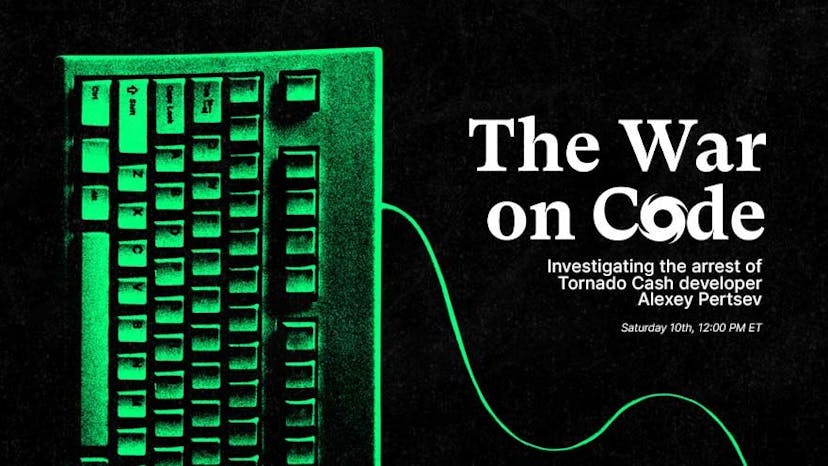Privacy Protocol Aztec Raises $100M
VCs Make Big Bet on VPN Player as Regulatory Risk Rises
By: Aleksandar Gilbert • Loading...
DeFi
In a deal that highlights the risks investors may face as crypto privacy clashes with an intensifying law enforcement crackdown, Aztec Network, a London-based company that bills its technology as the VPN for Ethereum, has raised $100M in a funding round led by a16z.
Aztec’s privacy-enhancing protocol has more than 70,000 unique users who have deposited over 60,000 ETH ($75M) in its smart contracts since it launched in July, according to a Dune Analytics dashboard. The company’s latest raise brings its total to $119M, according to data from CrunchBase.
“Many things we take for granted today – like e-commerce, secure accounts, and access control – might not have been adopted if all internet communication was in plaintext” — in other words, un-encrypted, a16z partners Ali Yahya and Guy Wuollet wrote in a blog post. “Blockchains are at a similar crossroads.”

Warren-Marshall Bill Assailed as a 'Direct Attack' on Crypto Users
Senators Say Law is Needed to Curb Money Laundering and Criminal Use of Cryptocurrencies
Although blockchains are anonymous, they are not private. This makes it possible to reconstruct a person’s financial life if one has the address of his or her crypto wallet.
“We believe encryption and privacy will be essential for blockchains to gain widespread adoption, and coordinate people, capital, and societies as the next era of the internet,” Yahya and Wuollet wrote.
The funding round comes at a difficult time for the crypto industry and, in particular, privacy-enhancing technology.
Crackdown on Blockchain Privacy
Tornado Cash, a decentralized protocol that allows users to obfuscate the flow of crypto assets, was sanctioned by the U.S. Department of Treasury in August due to its alleged popularity with North Korean hackers and other cybercriminals. Alexey Pertsev, a Tornado Cash developer, has been jailed in the Netherlands since August.

The War On Code: Investigating the Tornado Cash Sanctions and the Arrest of Alexey Pertsev
In August, just a few months ago on these very streets in Amsterdam, armed agents from the Fiscal Information and Investigation service (FIOD) suddenly arrested a man by the name of Alexey Pertsev…much to his own surprise. We do not yet know all the details surrounding his arrest, but what we do know is that…
U.S. politicians have also adopted a more combative stance vis-a-vis crypto since the collapse of centralized crypto exchange FTX last month. Founder and former CEO Sam Bankman-Fried has been accused of fraud, conspiracy and money laundering by U.S. law enforcement. He was arrested on Monday.
On Wednesday, Sens. Elizabeth Warren (D-Mass.) and Roger Marshall (R-Kan.) unveiled a bill that would ban financial institutions from using Tornado Cash-style mixers or other “anonymity enhancing technologies” and from utilizing crypto that had gone through such protocols.

Warren-Marshall Bill Assailed as a 'Direct Attack' on Crypto Users
Senators Say Law is Needed to Curb Money Laundering and Criminal Use of Cryptocurrencies
Since the sanction of Tornado Cash earlier this year, Aztec has insisted it has found a solution, based on cutting-edge technology, that should please the privacy-conscious as well as law enforcement.
Zero-Knowledge Proofs
Aztec and other privacy-enhancing crypto technologies use zero-knowledge proofs, a cryptographic way to show something is true without revealing the underlying data.
Jon Wu, Aztec’s head of growth, has suggested the protocol could implement know-your-customer (KYC) requirements without sacrificing user privacy using zk proofs.
Aztec users could, for example, prove their real-world identity when creating an account. They could then furnish a sort of KYC certificate when depositing and withdrawing money in the protocol without actually broadcasting their identity, Wu said on a live Twitter panel in August.
“I think the industry would be ignorant not to think that we could get away with technologies that are not proactively compliant, and I think Aztec and many other privacy networks are committed to finding that middle balance,” he said at the time.

Tornado Sanctions Test Resilience of DeFi Privacy Community
Privacy Mavens Tout ZK-Proofs as Solution for Users and States
“Aztec is building blockchain encryption without trade-offs,” the company said Thursday.
Advertisement
Get the best of The Defiant directly in your inbox 💌
Know what matters in Web3 with The Defiant Daily newsletter, every weekday
90k+ investors informed every day. Unsubscribe anytime.